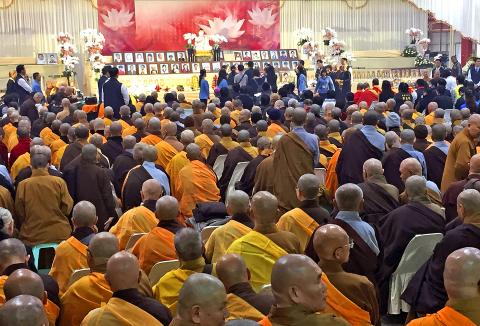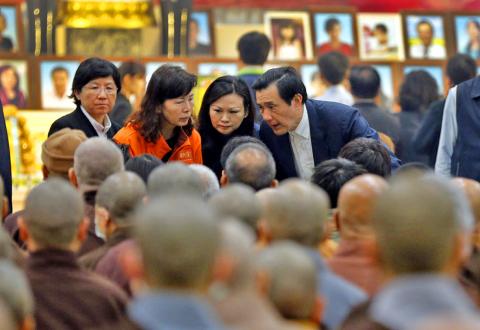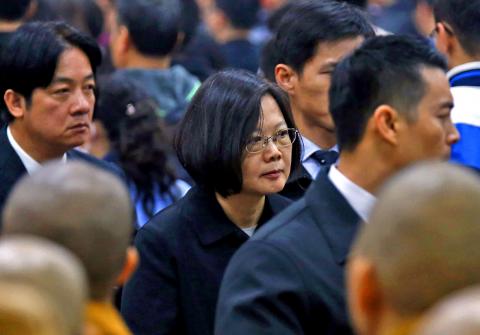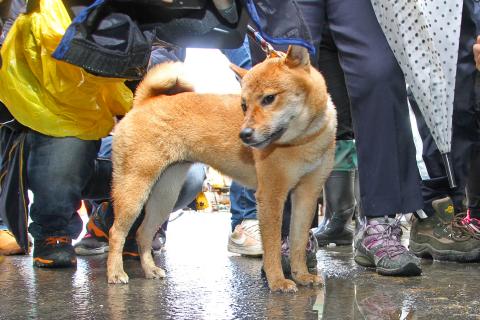Search-and-rescue teams yesterday finished clearing away most of the above-ground levels of the collapsed Weiguan Jinlong complex in Tainan, as the number of bodies discovered amid the rubble rose rapidly.
At press time last night, 31 bodies were found overnight on Thurday and yesterday, bringing the total death toll from the quake in Tainan to 95.
Twenty-seven Weiguan Jinlong residents are still unaccounted for.

Photo: Johnson Lai, AP
Most of the bodies that were retrieved over the past 24 hours had been so badly crushed that they were not readily identifiable, even by gender, rescue personnel speaking on condition of anonymity said.
At press time last night, rubble from most of the complex’s nine residential sections had been cleared away using heavy equipment, leaving buildings A and G as the focus of search efforts.
Both had been pushed several meters into the ground after buildings H and I — which formed the ends of the U-shaped complex — collapsed on top of them.

Photo: Ritchie B. Tongo, EPA
Tainan Civil Engineers’ Association president Cheng Ming-chang (鄭明昌) yesterday morning told a briefing to relatives of the missing that most of the people still unaccounted for were likely in those underground sections, which presented a particular challenge to the search teams.
Building A fell to the ground at an angle because of the soft soil and was severely damaged when Building H collapsed on top of it, he said.
Building G was similarly sandwiched under Building I, with the walls of its top story pushed down almost to street level.

Photo: Ritchie B. Tongo, EPA
While there had been concern yesterday that rain might affect rescue efforts, there should not be significant problems except for the searchers’ ease of movement now that much of the accumulated dirt had been carted away, Cheng said.
There was no timetable for dismantling the underground sections, he said.
Bodies that were retrieved yesterday were taken by ambulance to the Tainan Funeral Parlor, where DNA tests would be conducted to help determine their identities.

Photo courtsey of Chi Mei Medical Center
A Buddhist “Puja” memorial service marking the end of the first week since the disaster was held yesterday at a special memorial hall at the parlor dedicated to earthquake victims.
President Ma Ying-jeou (馬英九), president-elect Tsai Ing-wen (蔡英文), Premier Simon Chang (張善政), Legislative Speaker Su Jia-chyuan (蘇嘉全) and many other politicians attended the service.
Taiwan Rescue (中華民國搜救總隊) volunteers were pulled from the Weiguan Jinlong site in Yongkang District (永康) on Thursday night, and Tainan Deputy Mayor Tseng Hsu-cheng (曾旭正) yesterday said that there were enough personnel — a total of 919 — to handle the rest of the search, including crews from other cities and counties.

Photo: CNA
Search teams were being rotated in and out every two hours, Tseng said.
The non-governmental search-and-rescue organization withdrew after complaining that its access to the site had been restricted, preventing its members from fully participating in rescue efforts.
In other developments, the Ministry of Economic Affairs yesterday said that water service in quake-devastated areas of Tainan was set to resume last night.
Pipelines carrying water to about 30,000 households had been damaged by the quake, the National Fire Agency said.
Water would be sent via a 1km temporary above-ground pipeline, which has been connected to intact underground pipelines, the ministry said.
Additional reporting by Wang Chieh, Hsiao Ting-fang and Huang Wen-huang

MAKING WAVES: China’s maritime militia could become a nontraditional threat in war, clogging up shipping lanes to prevent US or Japanese intervention, a report said About 1,900 Chinese ships flying flags of convenience and fishing vessels that participated in China’s military exercises around Taiwan last month and in January have been listed for monitoring, Coast Guard Administration (CGA) Deputy Director-General Hsieh Ching-chin (謝慶欽) said yesterday. Following amendments to the Commercial Port Act (商港法) and the Law of Ships (船舶法) last month, the CGA can designate possible berthing areas or deny ports of call for vessels suspected of loitering around areas where undersea cables can be accessed, Oceans Affairs Council Minister Kuan Bi-ling (管碧玲) said. The list of suspected ships, originally 300, had risen to about 1,900 as

Right-wing political scientist Laura Fernandez on Sunday won Costa Rica’s presidential election by a landslide, after promising to crack down on rising violence linked to the cocaine trade. Fernandez’s nearest rival, economist Alvaro Ramos, conceded defeat as results showed the ruling party far exceeding the threshold of 40 percent needed to avoid a runoff. With 94 percent of polling stations counted, the political heir of outgoing Costa Rican President Rodrigo Chaves had captured 48.3 percent of the vote compared with Ramos’ 33.4 percent, the Supreme Electoral Tribunal said. As soon as the first results were announced, members of Fernandez’s Sovereign People’s Party

MORE RESPONSIBILITY: Draftees would be expected to fight alongside professional soldiers, likely requiring the transformation of some training brigades into combat units The armed forces are to start incorporating new conscripts into combined arms brigades this year to enhance combat readiness, the Executive Yuan’s latest policy report said. The new policy would affect Taiwanese men entering the military for their compulsory service, which was extended to one year under reforms by then-president Tsai Ing-wen (蔡英文) in 2022. The conscripts would be trained to operate machine guns, uncrewed aerial vehicles, anti-tank guided missile launchers and Stinger air defense systems, the report said, adding that the basic training would be lengthened to eight weeks. After basic training, conscripts would be sorted into infantry battalions that would take

GROWING AMBITIONS: The scale and tempo of the operations show that the Strait has become the core theater for China to expand its security interests, the report said Chinese military aircraft incursions around Taiwan have surged nearly 15-fold over the past five years, according to a report released yesterday by the Democratic Progressive Party’s (DPP) Department of China Affairs. Sorties in the Taiwan Strait were previously irregular, totaling 380 in 2020, but have since evolved into routine operations, the report showed. “This demonstrates that the Taiwan Strait has become both the starting point and testing ground for Beijing’s expansionist ambitions,” it said. Driven by military expansionism, China is systematically pursuing actions aimed at altering the regional “status quo,” the department said, adding that Taiwan represents the most critical link in China’s